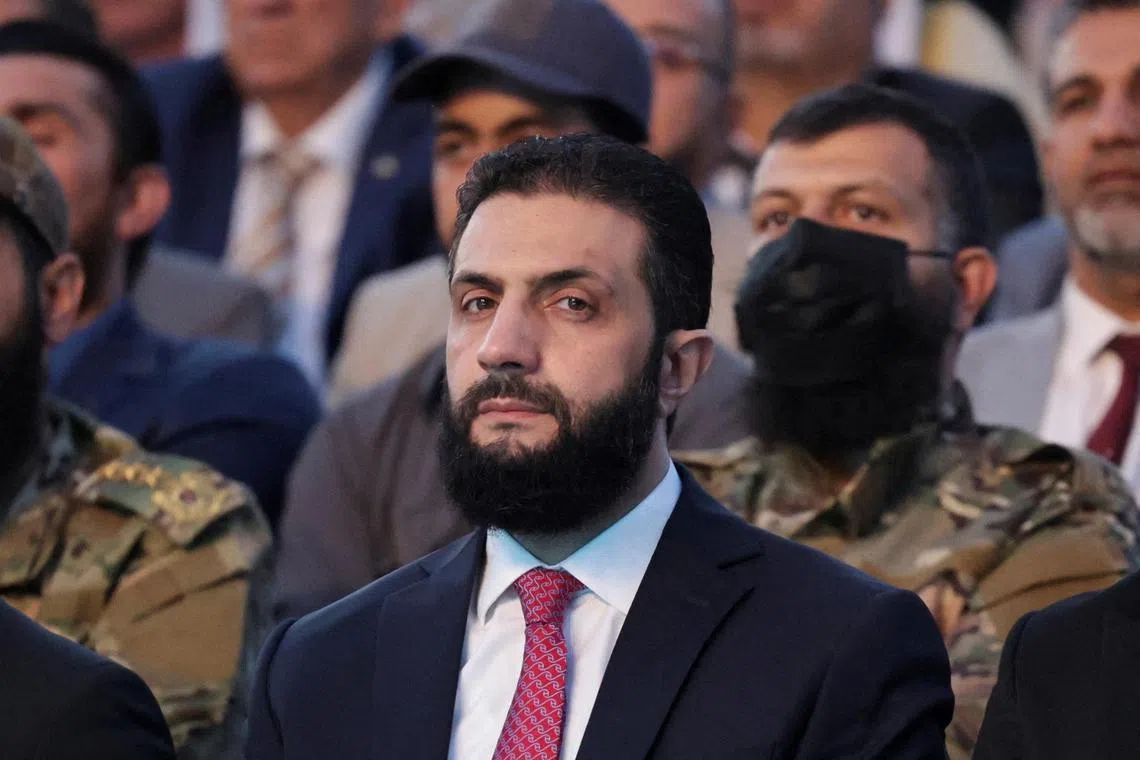US sees backing Syrian leader as key to countering Iran and Isis
Sign up now: Get ST's newsletters delivered to your inbox

The US and some European allies say backing Syrian President Ahmed Al-Sharaa is a way to stabilise and rebuild the country after a brutal civil war.
PHOTO: REUTERS
Follow topic:
US support for new Syrian President Ahmed Al-Sharaa is essential to reducing Iran’s influence in the country and prevent Islamic State from reorganising, according to Washington’s special envoy for the Middle Eastern state.
“The US objectives, and his objectives, and all of the allies’ objectives at the moment are aligned, but there’s so many constituencies who would like to interfere with that relationship,” Mr Tom Barrack, who is also US ambassador to Turkey, told reporters in Washington on July 31. “Iran, on the other side, is a much more intense issue and problem for all of us.”
Cells controlled by Iran’s Islamic Revolutionary Guard Corps and Isis, the Islamist group also known as Islamic State, “have a lot of common elements that want to disrupt the situation,” he said.
Mr Sharaa, a former commander of Al-Qaeda’s affiliate in Syria, led an offensive late last year that toppled former Syrian President Bashar Al-Assad, ending a more than 24-year-rule that had been supported mainly by Iran and Russia.
The US and some European allies say backing Mr Sharaa is a way to not only combat Iran and Islamic State but also stabilise and rebuild the country after a brutal civil war that started in 2011.
With strong lobbying by the leaders of Turkey and Saudi Arabia, who are eager to expand their influence in Syria, US President Donald Trump met Mr Sharaa in Saudi Arabia in May. Mr Trump announced the suspension of crippling sanctions against Syria in return for multiple pledges including keeping extremists out of the government and expelling foreign fighters from the country.
However, sectarian clashes in Syria, including fighting that last month claimed the lives of more than 1,300 people, have cast doubt over Mr Sharaa’s intentions. The president’s forces sided with their Sunni Muslim co-religionists against the Druze minority, and human rights groups said atrocities were committed against civilians.
Israel has vowed to protect the Druze, who also have a sizeable presence in that country and Lebanon, and remains distrustful of Mr Sharaa. At the height of the fighting last month, Israel has deployed troops in parts of Syria and bombed Mr Sharaa’s forces and the Ministry of Defence in Damascus. It has also pushed for demilitarised zone south of the capital.
The US helped broker a ceasefire that went into effect two weeks ago.
“Ultimately, they all have to get to peace,” Mr Barrack said. “I don’t think any of us know what the cadence of that is. So all we’re trying to do as the US is to be an honest broker.” BLOOMBERG

